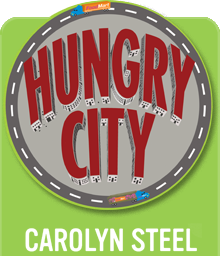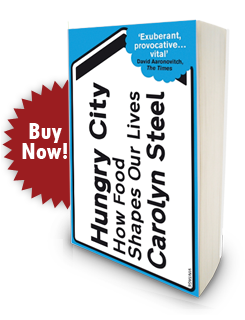2. Supplying the City
Listen to this podcast:
Chapter Two is about the way food reaches cities. Food is not something you would naturally choose to transport very far: it is soft and squishy and has a tendency to go off. That makes the transport of it almost as hard as growing it in the first place. In the pre-industrial world, managing the food supply was the biggest headache cities faced, and it effectively limited where they could be built and how large they could grow. The only way of importing large amounts of food was by sea, which meant that land-locked cities such as Paris faced an increasing struggle to feed themselves as they grew larger, often with dire political consequences. Whether or not Marie-Antoinette ever said ‘Let them eat cake’, bread shortages were key to the social unrest that led to the French Revolution.
After industrialisation, everything changed. With the arrival of the railways, along with inventions such as canning and freezing, it became possible for the first time to build cities more or less anywhere and any size. One important consequence of this was that urban authorities began to loosen their grip on the food supply, relying more and more on commercial companies to feed the urban population. That might have seemed a good idea at the time, but the result today is that we are totally reliant on trans-national corporations to feed us, who have no civic responsibility and no interests at heart other than making money. That puts them in an extremely powerful position – especially when you consider how difficult it is to feed cities as large as those we now live in. Because it happens invisibly, we tend to assume that feeding cities these days is easy. It isn’t. It’s a highly sophisticated process that relies on phenomenal levels of skill, coordination and energy – and ‘just in time’ deliveries that keep stocks of food to an absolute minimum. Food security is an increasingly urgent global concern, and not just for developing nations, but for every one of us.












June 17th, 2016 at 12:33 am
I have fun with, lead to I discovered exactly what I used to be having a look for.
You’ve ended my four day long hunt! God Bless you man. Have a great
day. Bye
June 17th, 2016 at 1:07 pm
I’d like to find օut more? I’d want to find out
more detаils.
June 17th, 2016 at 1:25 pm
After looking ovber a handful of the blog articles on your web page, I truly like your way
of blogging. I bookmarked it to my bookmark webpage list and will be
checking back soon. Please check out my website too and let
me know your opinion.